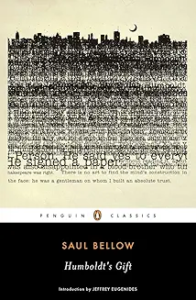Humboldt’s Gift by Saul Bellow 1973
It’s not necessary to have run a marathon in order to finish this book, but I found the unwillingness to quit and the commitment to press on that I developed in training for and finishing three marathons came in handy in finishing this 500 page, densely worded novel by Nobelist Saul Bellow.
Bellow is a consensus pick for one of the great novelists of the 20th C. The winner of a Pulitzer Prize, the only writer to win three National Book Awards, and the recipient of the Nobel Prize in Literature winner in 1976, his works are shoo-ins for inclusion in ‘classics’. In choosing which of Bellow’s 14 novels to read, I consulted an article from the ‘Guardian’ where Bellow’s biographer Zachary Leader identified the five ‘essential’ Bellow novels. I had already read the first three on the list, so I turned to “Humboldt’s Gift”, the fourth one.
It’s a big, complicated, funny novel that takes place primarily in Chicago where Charlie Citrine, a 50 something year old is contending with a divorce proceeding, an angry and violent mobster to whom he owes money, expensive lawyers, a much younger sexy woman who wants to be Mrs. Citrine, and a variety of academic friends and enemies. Charlie, who had achieved a modicum of fame and wealth with a successful Broadway play that was made into a movie, just wants to be left alone to contemplate what Whitman referred to as the main question, i.e. what happens when we die. Citrine has fallen under the influence of anthroposophy and feels that the soul continues to exist after the body dies, can be communicated with, and , returns in another form in the future. He is, however, continuously distracted from his thoughts by things like his Mercedes being beaten to a pulp with a baseball bat, his wife convincing the judge to garnish his life savings, his academic associate Thaxter defaulting on a loan which Charlie has guaranteed, and his love affair with the beautiful Renata. Underlying all of this is Charlie’s love for Von Humboldt Fleisher, an eccentric poet and philosopher who ‘adopted’ Charlie when he was still in college and when Humboldt was a major presence in Greenwich Village. The two of them spent time together on the faculty at Princeton, but as he aged, Humboldt became more garrulous, isolated, and crazy. When Humboldt dies, broke and broken in New York City, Citrine is afflicated with life long guilt, but Humboldt’s will surprisingly provides a ‘gift’ for Charlie that saves the day.
Complicated? for sure. Funny? for sure. A brilliant example of Bellow’s love of language, characters, and Chicago? for sure. I found many references to my hometown that delighted me–Waldheim Cemetery where my grandmother is buried; Kedzie and Division Streets where my uncle’s and my father’s business was located; the Picasso sculpture at the courthouse; the El; and on and on. Chicago is clearly one of the main characters in the book.
Despite all the silliness and intrigue, the complicated plot, and the many colorful characters, Bellow is working out his own complex feelings about death and oblivion and how the individual deals with the inevitable while in this world. The book ends happily but then again, there’s always the grim reaper around the corner.



